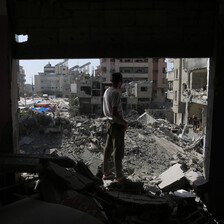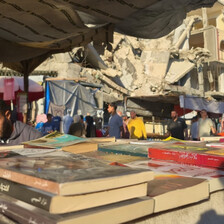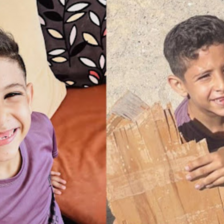The Electronic Intifada 9 June 2024

Israel killed more than 210 Palestinians in Nuseirat refugee camp this weekend.
APA imagesEvery time Israel issues evacuation orders, I am reminded of my own displacement.
I vividly remember how Israel forced my family to flee our home. We were not even given a chance to bid it farewell.
Since the beginning of the current war, Israel has been claiming that certain areas are safe and others are not.
For a long time, everyone has known there is no such thing as a safe area in Gaza. You are a target regardless of where you live or have taken shelter.
I have witnessed firsthand the conditions of displaced people, the overcrowded streets, vehicles laden with belongings hastily gathered from houses or tents.
Everyone who is displaced knows there is no possibility of going back and collecting things they forgot to bring.
I was not in any way prepared when I fled my home in al-Rimal, a Gaza City neighborhood. I had to leave as Israeli troops had invaded the surrounding area in tanks.
All I could do was grab clothes for myself and my children.
Then, we hurried through the streets until finding refuge in a school.
I have previously worked as an English language teacher. I am accustomed to entering schools so that I can give a class.
This time I was entering a school for a completely different reason: to try and stay alive.
Living in a school was unbearable. We lacked water or even seats.
It was completely unsuitable for my children.
Road of death
When hope of going back to our home faded, I decided to leave Gaza City. My family have a house in Nuseirat refugee camp, central Gaza.
On 17 November – as Israeli forces intensified their violence against Gaza City – we fled through Salah al-Din road.
It had been designated a “humanitarian corridor” by Israel. In reality, it was a road of death.
We began our journey at 9 am.
I walked holding the hand of my 7-year-old child. My husband carried our 3-year-old son.
The road teemed with people carrying bags of flour and mattresses. Some were assisting injured members of their families.
Explosions and the sound of gunfire filled the air. Israeli tanks lurked behind the sand barriers.
Confusion and fear reigned. We were worried that we would be caught in the crossfire or trampled if there was a stampede.
The scenes of death, destruction and terror along the way defied the imagination.
We reached Nuseirat camp around 3 pm. By that time, we were so exhausted that we could barely stand.
In December, Israel invaded the Middle Area of Gaza, including Nuseirat and Bureij refugee camps.
After the windows of our house were shattered by shrapnel, we fled to Rafah, Gaza’s southernmost city, without a clear destination in mind.
We spent a day in a tent but I couldn’t bear the miserable conditions. Then my relatives in Rafah offered us shelter.
Eventually, we found rented accommodation and stayed in it for two months.
There was no respite. While we were in Rafah, Israel repeatedly threatened to invade it.
Fearing that we would come under attack, we went back to my family’s house in Nuseirat, despite how it was partially destroyed.
Nuseirat has now been subjected to more violence. Over 210 Palestinians were killed by Israel in its 8 June attack on the camp.
Months have passed since we were uprooted from al-Rimal.
I still yearn for the opportunity to bid my home farewell or capture a final image of it.
Nothing compares to the comfort of my own home. Everywhere else I have stayed reminds me of that fact.
I empathize deeply with everyone who has been displaced.
Being forced to move repeatedly leaves us trapped in a vicious circle. We have no idea where we will end up.
Iman Abo Qamar is a writer and translator in Gaza.




